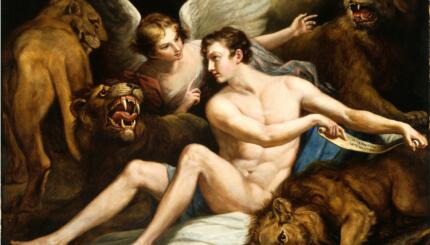Commentary on Parashat Bechukotai, Leviticus 26:3-27:34
The penultimate chapter of Leviticus consists of a divine plea to heed God’s commandments. It takes the form of inducements and intimidations, promises of agricultural bounty and national tranquility and threats of defeat, chaos and exile. The future of ancient Israel in its homeland will depend entirely on its adherence to the revelation at Sinai. Aside from the poetry of the passage, its rhetoric pulsates with a tone of urgency. Free will has its risks; people may choose to put themselves in harm’s way. Rebellion against the strictures of God is the persistent evil that endangers society.
Neither this collection of admonitions nor those at the end of Deuteronomy are cast in terms of life after death or the world-to-come. They are utterly different from the hellfire sermons of Puritan New England in which compliance is coerced through damnation. The religious vocabulary of the Torah, and indeed the Tanakh (the full Bible, comprising the Torah, Prophets and Writings), is pervasively this-worldly. Life predominates as the supreme value and relegates an inchoate notion of the afterlife — Sheol — to the margins of collective consciousness. Accordingly, retribution or reward are natural phenomena, occurring in the here and now. The language betrays no notion of a soul that transcends death.
Equally noteworthy, the audience for our concluding address is the people as a whole, and not the individual Israelite. What will be weighed in the balance is the piety and morality of the nation, which if found to be wanting will impact adversely on the fate of the minority of God-fearing citizens. To abide personally by God’s will can secure one’s well-being only if a sufficient number of others do the same. Hence, the paradigmatic nature of Abraham’s discourse with God on the fate of Sodom and Gomorrah. How many righteous members will it take to avert the destruction of a community? Throughout much of the Bible the group takes precedence over the individual. The marquee actor in the drama is the nation. The Torah’s legislative agenda is to forge a mass of slaves into “a kingdom of priests and a holy nation,” a beacon of justice and righteousness for an ever wayward humanity.
For all their power, then, these admonitions could not be the final word on God’s moral calculus. While history confounds the correlation between the fate of the nation and its character, the plight of the individual begged for divine empathy. The Hellenistic world, with its heightened sensibility for the priority of the individual, created the context for post-biblical Judaism to absorb a full-blown belief in life after death. By the first century B.C.E., the Second Book of Maccabees eases the pain of martyrdom with the promise of immortality and resurrection. And several centuries later, the Mishnah makes the belief normative: those who deny that the doctrine of resurrection is not to be found in the Torah forfeit their place in the world to come (Sanhedrin 10:1).
With your help, My Jewish Learning can provide endless opportunities for learning, connection and discovery.
What interests me in this theological evolution is how the earlier biblical strata are salvaged. Creative exegesis allows for reconciliation. The master of this preservative technique is Maimonides, who devoted his life to rereading the Bible in light of Aristotelian philosophy. Hebrew Scripture and Greek philosophy served as two media for the expression of the same truths.
The material blessings stipulated in Leviticus and Deuteronomy, for Maimonides, represent an intermediary stage in the path to individual salvation. By providing for our collective physical needs — fertility and food, law and order and domestic tranquility and national security — they generate the conditions within which we can indulge our love of Torah full time.
Reconsidering these blessings after more than a millennium of national exile, Maimonides understood them to be a depiction of the messianic era, when a scion of King David will have restored the Jewish people to its land, rebuilt the Temple and achieved a lasting state of peace. None of this will be effected through divine intervention, but solely through enlightened leadership. Though “the wolf shall dwell with the lamb and the leopard lie down with the kid,” the nature of the world will remain unchanged. The Messiah is but a warrior steeped in Torah, a mortal combining the prowess of Bar Kochba with the piety and profundity of Rabbi Akiva.
Maimonides draws a sharp distinction between the messianic era and the world-to-come. The former is natural and collectively experienced; the latter supernatural and individually attained. The messianic era creates an ideal set of circumstances in which each of us can pursue what the harsh reality of daily life denies us: the undistracted study of Torah. According to Maimonides, “neither the prophets nor the rabbis yearned for the messianic era in order to rule the world or oppress the gentiles or enter into matrimony with them or wine and dine, but solely to be free to engage in Torah and philosophy.” A world at peace becomes the springboard for individual salvation.
In this vision of the world-to-come, the love of God expressed in the ceaseless endeavor to fathom the nature of God leads to the immortality of the soul. As our understanding expands, our love intensifies and rationality gives way to mysticism. Union with God is the ultimate blessing for those solitary individuals who have extended themselves intellectually to serve the Almighty without desire of reward (Mishneh Torah, Hilkhot Teshuvah, chapters 8-10; Hilkhot Melakhim, chapter 12).
For all his elitism and intellectualism, Maimonides has caught the spirit of Leviticus’ litany of reward and rebuke. Coming at the end of the Holiness Code (chapters 17-26) the composition reaches for a level of morality that would transform our brutish existence into a paradigm of the good life.
Reprinted with permission of the Jewish Theological Seminary.
Torah
Pronunced: TORE-uh, Origin: Hebrew, the Five Books of Moses.


